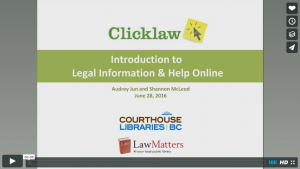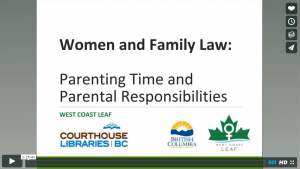2016 Bi-monthly Update Series: May-June
In our 2015 year-end update, we promised to provide bimonthly updates to new resources and services added to Clicklaw in those two months. Here is a sample from the hundreds of changes in May and June:
Jan-Feb | Mar-Apr | May-Jun | Jul-Aug | Sep-Oct | Nov-Dec

by Nidus Personal Planning Resource Centre and Registry
- Adult Guardianship in BC: Private Committeeship and Statutory (Public) Guardianship
- Guide to Making & Registering Your Enduring Power of Attorney (EPA)
- General and Specific Authorities in an Enduring Power of Attorney

by Legal Services Society
New French Edition added. Sponsorship Breakdown is for permanent residents and conditional permanent residents who need help when the person sponsoring them in Canada is no longer supporting them, and they are unable to support themselves. Explains what happens when a sponsorship breaks down, and how to apply for welfare.
Updated Dial-a-Law Scripts
by Canadian Bar Association, BC Branch

by BC Residential Tenancy Branch
This booklet provides a summary of the key features of the Manufactured Home Park Tenancy Act and how they affect landlords and tenants in manufactured home parks in British Columbia.

by West Coast LEAF
Roads to Safety is a legal handbook for older women in BC that covers legal issues that older women may face when they have experienced violence. It explains rights and options, using stories to illustrate the legal information.
Formed through a partnership between West Coast LEAF and UBC’s Allard School of Law to provides free and low-cost legal services to women. Services are provided by upper year law students, under the supervision of staff lawyers. Rise offers a range of services, from information and summary advice, unbundled legal services, and in some instances representation in court. Currently accepting appointments for Tuesdays and Wednesdays from May 24 to July 20; fall dates TBA.
Common Questions: In response to questions we have been asked repeatedly via email, reference or by webinar attendees, we added three new FAQs this June:
- I’m a refugee abroad. How can I get to BC (Canada)?
- What is the difference between Personal Planning and Estate Planning?
- What can a landlord ask or require of me before renting?
An Evaluation of the Clicklaw Wikibook JP Boyd on Family Law: Final Report
by Canadian Research Institute for Law and the Family
This study assesses outputs & outcomes of the JP Boyd on Family Law wikibook by analyzing data from Google Analytics and data collected from a pop-up survey of users, a follow-up survey administered 1 week later and a follow-up survey 6 months later, to gauge the efficacy of wikibooks as a collaborative PLE model.
Disclosing Your Disability: A Legal Guide for People with Disabilities in BC
by Disability Alliance BC
The guide discusses the legal rights and responsibilities around disclosure for people with disabilities in the context of employment.
HIGH STAKES: The impacts of child care on the human rights of women and children
by West Coast LEAF
This report is grounded in diverse women’s real-life stories about how the inadequacy of the child care system has impacted them and their children—undermining their safety, well-being, & human rights. The report analyzes the legal implications of these harms and calls for urgent government action.
Responding to Child Welfare Concerns: Your Role in Knowing When and What to Report
by BC Ministry of Children and Family Development
Updated for 2016, this booklet explains when to report child abuse and neglect, and what to report. Includes what child abuse and neglect is, warning signs, what to do if a child tells you about the abuse, and what to do if you suspect abuse. It also explains what to expect when you make the report and what happens next.

Clicklaw Refresher (Webinar Recording)
by Clicklaw + LawMatters (Courthouse Libraries BC)
See the recording of our live 1-hr webinar for front-line community workers, advocates and public librarians. Learn how to search online for reliable legal information & help specific to BC, with an overview of how to use Clicklaw, the HelpMap, and the Clicklaw Wikibooks.

Women and Family Law: Parenting Time and Parental Responsibilities (Webinar Recording)
by West Coast LEAF and Courthouse Libraries BC
See the recording of this live 1.5-hr webinar on recent changes to family law in BC and their impacts on the parenting experiences of women with abusive or harassing exes. Speaker Zara Suleman considers some common legal challenges including parenting assessment reports, denial of parenting time, relocating with a child, and litigation harassment. Zara offers lawyers and frontline service providers who assist women fleeing abuse effective strategies to cope with and address these issues.
 Notice – BC Government URLs
Notice – BC Government URLs
You may have noticed that some of the links to websites hosted by the BC Government may be broken as they restructure. We are currently working with BC Gov website staff to keep links updated. For example, see the updated link to Family Justice in BC.










